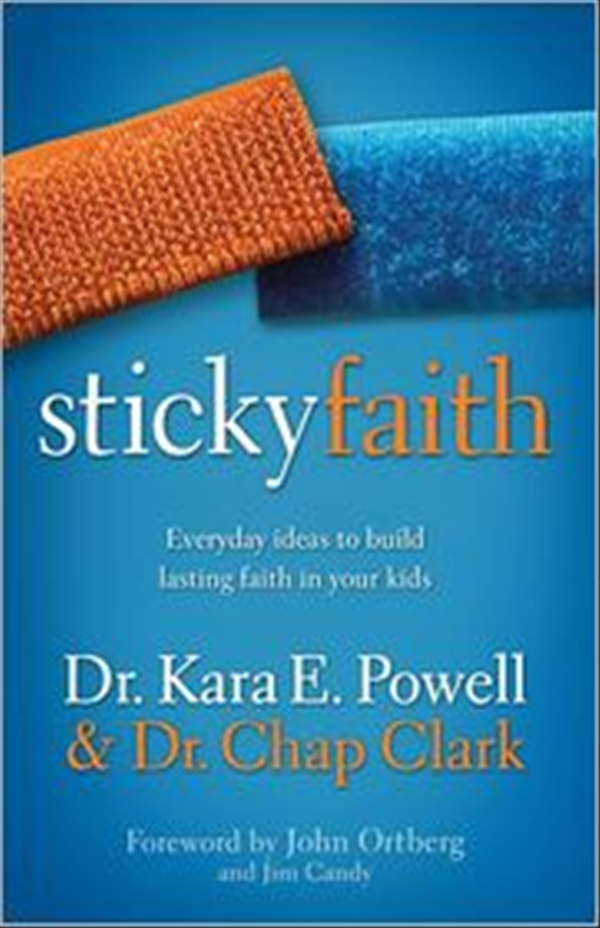Why We Must Talk about Faith at Home

One of our most exciting research projects at the Fuller Youth Institute is our College Transition Project, a culmination of 5 years of study of 500 youth group kids as they transition to college. The goals of this research are to study youth group graduates as they leave youth ministry and to offer help to parents, leaders and churches in building a faith that lasts, or “Sticky Faith”. In the midst of a host of factors that help develop Sticky Faith, some of our most intriguing findings point to the role of parents and family conversations about faith.
Reason #1: Parents are usually the most important spiritual influence in their kids’ lives.
While we believe in the power of adult mentoring (we are both youth ministry volunteers at our respective churches), it’s challenging to point to a Sticky Faith factor that is more significant than students’ parents.
Following his nationwide telephone survey of 3,290 teens and their parents, as well as 250 in-depth interviews, sociologist Dr. Christian Smith concluded, “Most teenagers and their parents may not realize it, but a lot of research in the sociology of religion suggests that the most important social influence in shaping young people’s religious lives is the religious life modeled and taught to them by their parents.”[1]
As Smith more simply summarized at a panel at Fuller Seminary, “When it comes to kids’ faith, parents get what they are.”[2]
Of course there are exceptions. Your own faith might be vastly different than your parents’. Plus we’ve met plenty of parents whose kids end up all over the faith spectrum. But parents are more than an initial launch pad for their kids’ journeys; they continue to shape them as ongoing companions and guides.
Reason #2: Most parents miss out on opportunities to talk about faith with their kids.
At Fuller Seminary, we have great respect and affection for the Search Institute, a research center devoted to helping make communities a better place for kids. According to Search’s nationwide study,12% of youth have a regular dialog with their mom on faith/life issues.[3] In other words, one out of eight kids talks with their mom about their faith.
It’s far lower for dads. One out of twenty, or 5%, of kids have regular faith/life conversations with their dad.
One more interesting statistic: Approximately 9% of teenagers engage in regular Bible reading and devotions with their families. So not even one out of ten teenagers looks at Scripture with their parents. When it comes to matters of faith, mum’s usually the word at home.
Reason #3: The best discussions about faith happen not just when parents ask questions but when parents share their own experiences too.
That relatively small group of parents who do talk with their kids about faith tend to default to asking their kids questions.
- What did you talk about in church today?
- How was youth group?
- What did you think of the sermon?
- Depending on the personality and mood of the kid, responses usually range from grunts to “the usual”. Not very satisfying for the parent or the kid.
Our research shows that asking these questions can pay off. But as vital to Sticky Faith is that parents also share about their own faith.
In other words, parents shouldn’t merely interview their kids; they need to discuss their own faith journey and all of its ups and downs too.
How Can I Help Parents Talk About Faith in the Midst of Normal Life?
While the average age of youth leaders is on the rise, many of you are likely not yet parents. Or if you are parents, your kids are not yet teenagers, which is true of both of us.
Like you, one of the great benefits of our experience in youth ministry is the hundreds of families we have closely observed. Regardless of your age or life stage, one of the best ways to cast a vision in your ministry for family faith discussions is to share stories of other innovative parents—either stories of parents in your ministry or stories of parents like those below. During the course of our research, our FYI team has been continually impressed with parents’ creativity in planting that same DNA in their own families. In most cases, parents are simply weaving faith conversations through the everyday events of life (i.e., you’re going to have breakfast anyway, right?).
Breakfast Dates
One member of our team, Dr. Cheryl Crawford, talked with one dad of four daughters who took each of them out for a one-on-one breakfast date every week. Yes, that’s four breakfast dates every week. And he did that with them throughout middle school and high school.
Dinner Questions
On nights our (Kara’s) family has dinner together, we have a tradition of sharing our “highs” and “lows” of the day. Because of what we’ve learned about Sticky Faith, we’ve added a third question: how did you see God at work today?
The first time we added that question to our conversation, our seven year-old said quickly, “But I can’t answer that question.”
“Why not?” I asked.
“Because I don’t have a job.”
Once we explained that we meant, “How did you see God working today?” she realized she could be part of the discussion.
Often our kids don’t have an answer to that question, and that’s OK. In fact, more important than the kids answering that question is that they hear Dave and me answer that question every day.

Dr. Chapman “Chap” Clark is Vice Provost for Regional Campuses and Masters Programs and Professor of Youth, Family, and Culture at Fuller Theological Seminary. Chap’s extensive publication of books, articles and videos focus primarily on relationships. Among his many books are Hurt 2.0, When Kids Hurt, Disconnected: Parenting Teens in a MySpace World (co-authored with his wife, Dee), and Deep Justice in a Broken World. He is the co-author of Sticky Faith: Everyday Ideas to Build Lasting Faith in Your Kids Series (Zondervan, Sept. 2011). Chap and Dee currently live in Gig Harbor, Washington.
[1] Christian Smith with Melinda Lundquist Denton, Soul Searching: The Religious and Spiritual Lives of American Teenagers (New York: Oxford Press, 2005), 56.
[2] Listen to the “Soul Searching” panel discussion from March 2008 at the FYI website: http://fulleryouthinstitute.org/2008/03/soul-searching-panel/.
[3] Search describes their study of 11,000 teenagers from 561 congregations across 6 denominations in the Search Institute research report, Effective Christian Education: A National Study of Protestant Congregations, 1990.
Originally published October 17, 2011.






